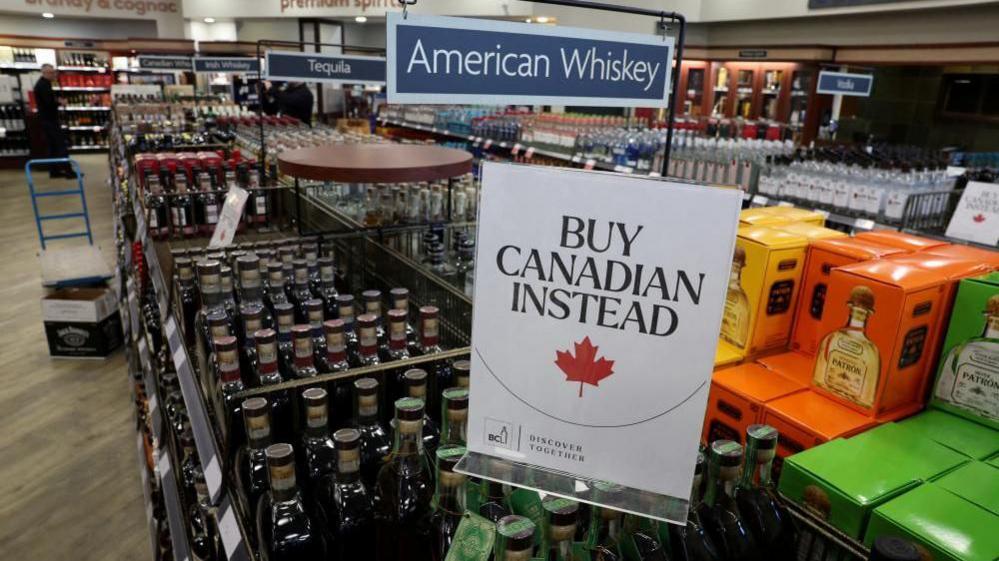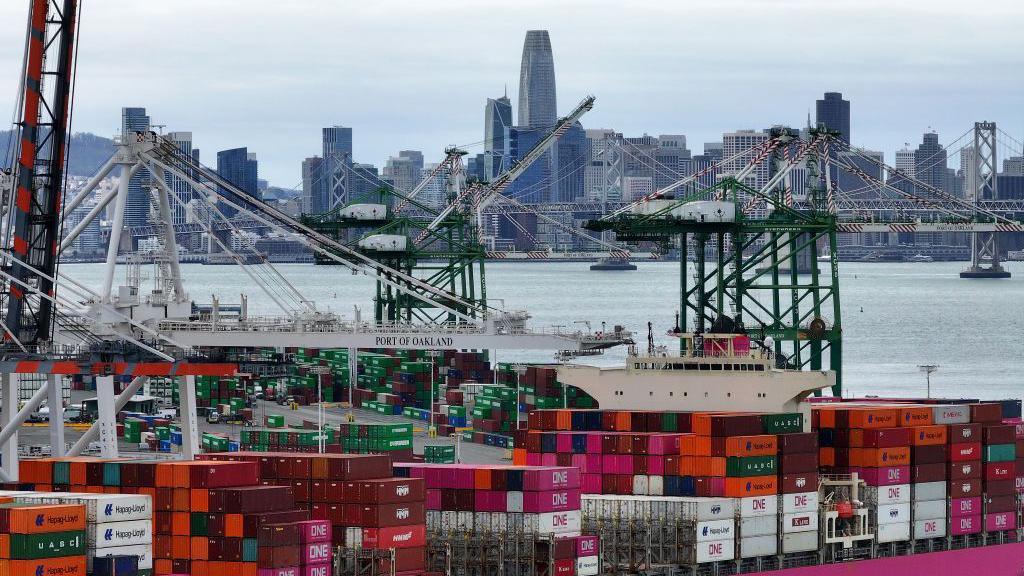Trump agrees to pause tariffs on Canada and Mexico but not on China
Watch: 'I'm getting angry and anti-American' - Canadians decry tariff threat
- Published
President Donald Trump has agreed to hold off imposing 25% tariffs on Canada and Mexico for 30 days, pulling the North American neighbours back from the brink of a potentially damaging trade war.
After last-minute calls with Trump, Canadian Prime Minister Justin Trudeau agreed to reinforce his country's border with the US to clamp down on migration and the flow of the deadly drug fentanyl.
Earlier, Trump made a deal with Mexican President Claudia Sheinbaum. She agreed to reinforce the northern border with troops. In return the US would limit the flow of guns into Mexico.
But a US tariff of 10% on Chinese imports has come into effect, after a deadline of 00:01 EST (05:00 GMT) on Tuesday passed.
Shortly after, Beijing announced it was imposing retaliatory tariffs on a raft of American products, including 15% on coal and liquefied natural gas and 10% on crude oil and agricultural machinery.
Trump earlier said he planned to speak on the phone to his Chinese counterpart soon. He described the 10% import taxes as the "opening salvo" and said they could become "very, very substantial" if no agreement is made.
Monday's breakthrough with Canada and Mexico came as they prepared retaliatory tariffs on American goods.
After two phone calls on Monday, Trump and Trudeau posted on social media that they had reached a temporary agreement on securing the border that would avoid tariffs for at least 30 days.
Both leaders portrayed the plan as a win.
"As president, it is my responsibility to ensure the safety of ALL Americans, and I am doing just that. I am very pleased with this initial outcome," Trump wrote on his social media site Truth Social.
Watch: US anthem booed at basketball and hockey games in Canada
Trudeau said Canada was implementing a $1.3bn (£1bn) border plan that included nearly 10,000 frontline workers and more resources to halt the flow of fentanyl, a synthetic drug 50 times stronger than heroin, which Trump has cited as a major concern.
The prime minister also said Canada would appoint a "fentanyl czar" and launch a joint strike force with the US to combat crime, fentanyl and money laundering.
Much of the border security plan had already been announced by Canada in December.
It includes enhanced co-ordination with US law enforcement, increased information sharing, limiting traffic at the border, and the deployment of drones and Black Hawk helicopters for surveillance.
The news came just hours after Trump paused a separate tariff on Mexican goods in exchange for that country sending 10,000 National Guard troops to its border with the US.
President Sheinbaum broke the news on X, writing she had had a "good conversation with great respect for our relationship and sovereignty" with her US counterpart.
Trump described his phone conversation with the Mexican leader as "very friendly".
In 2019, Mexico's government agreed to send 15,000 soldiers to its northern frontier to avoid tariffs from the first Trump administration.
The opening salvos have been fired in Trump's trade war - what comes next?
- Published4 February
Who won and lost as Trump's trade war is delayed - for now
- Published4 February
What are tariffs and why is Trump threatening to use them?
- Published5 November
Trump has framed tariffs as a tool for growing the US economy, protecting jobs and raising tax revenue.
"Tariffs for us, nobody can compete with us because we're the pot of gold," he said on Monday afternoon.
"But if we don't keep winning and keep doing well, we won't be the pot of gold."
Economists, however, have warned that tit-for-tat tariffs could raise prices for a wide range of products, including cars, lumber, steel, food and alcohol.
Items had already been removed from some shelves, and stock markets lurched downwards on Monday before recovering slightly with the announcement that tariffs had been suspended.

Andrew Furey, premier of Newfoundland and Labrador, acknowledged that the 30 days had brought some relief, but warned Canadians that a trade war still loomed.
He told the BBC he looked forward to using "the calm Canadian diplomatic approach to try to resolve any future tariffs", but cautioned against further "chaotic" actions from the US president.
"We're left as Canadians feeling a bit confused by this attack from our closest friend, our largest trading partner, our ally, family," Furey said.

The premier of Ontario - Canada's most populous province, which makes up about 38% of the country's GDP - welcomed the pause and said he would suspend plans for retaliatory measures.
Premier Doug Ford wrote on X: "Make no mistake, Canada and Ontario continue to stare down the threat of tariffs.
"Whether it's tomorrow, in a month or a year from now... President Trump will continue to use the threat of tariffs to get what he wants."
On Sunday, Trump indicated the 27-nation European Union would be his next target for tariffs, without providing further details.
The American president suggested that Britain, which left the EU in 2020, might be spared much duties.

EXPLAINED: What Trump has done since taking power
FOREIGN POLICY: Greenland's dark history - and does it want Trump?
DOMESTIC POLICY: Turmoil as Trump and Musk target top US aid agency
PROJECT 25: The right-wing wish list for Trump's second term